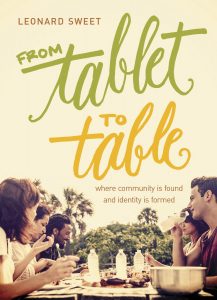 Growing up, I listened to a lot of Christian music. One of my favorites was a guy named Russ Taff. He had a great song that I still enjoy – in fact, it’s on my goto playlist on my iPhone. The song is called Table in the Wilderness, and the lyrics begin this way:
Growing up, I listened to a lot of Christian music. One of my favorites was a guy named Russ Taff. He had a great song that I still enjoy – in fact, it’s on my goto playlist on my iPhone. The song is called Table in the Wilderness, and the lyrics begin this way:
There’s a table in the wilderness
Where the blind can see and the poor possess
Where the weak are strong and the first one’s last
There’s a table in the wilderness
There’s a table in the wilderness
Where the blessed sing of His tenderness
Where the lame can walk and the weary rest
At the table in the wilderness…
Another verse that I really like…
When you close your eyes kneeling by your bed
All the working hours spinning through your head
You remember the place that your heart desires
Where you found your life, you’ll found life
At the table in the wilderness
Where the blind can see and the poor possess
Where the weak are strong and the first one’s last
There’s a table in the wilderness…
When I read Len Sweet’s latest book, From Tablet to Table: Where Community Is Found and Identity Is Formed, I thought of this song, because in my mind, I picture God’s table filled with the poor, and blind, the weak and weary, the rich and the strong. It’s a table big enough to gather the extremes of society, and everyone in between. And it’s around that table that we all are equal, and where we get formed into the beautiful body of Christ.
The Problem
Len opens his book in this way:
When any species undergoes a reproduction crisis, a name is given it: “endangered.” Arguably Christianity has entered such a crisis; our inability to reproduce the faith is the number one problem facing our families and churches today.
“The dominant means” he says “of addressing the church’s reproduction crisis has been to devise new methodologies and strategies for how we do church. This is a misdiagnosis of the problem, however, and without the right diagnosis of the disease, a cure is difficult.” And he’s no doubt right on this? We’re seeker, progressive, emergent…All of these terms have, in some way, been hailed as the new way of doing church. And yet Christianity continues to decline in the West.
So what is the problem? Len says:
Christianity in the West is suffering from an identity crisis. Instead of finding our identity in Jesus , we have tried to build an alternative identity on a Christian worldview, on biblical values, or on Christian principles, as though these are the cure-alls for our deteriorating faith and declining condition.
And the cure for our identity problem? Bring back the table!
The table is the place where identity is born. It is the place where the story of our lives is retold, re-minded, and re-lived.
Humans are wired for story. We become our stories. When we go in search of our identity, we don’t look for values or principles or worldviews; we look for fireworks in the sky, synapses that cause our cells to fire together and wire together. Story and image are the protons and neutrons swirling in the cells of our self-concept. At the subcellular level, we don’t crave a tablet full of values and principles and props; at the core of who we are, we crave a narraphor (a story made with metaphors that help us understand the world, ourselves, and God better).
You see, “families are defined by the stories they generate, by the stories they remember together over and over. Christian families are defined by the Story of Jesus and God’s relationship to humanity throughout history. And this story of our identity as a Christian people is relayed through the narraphors we tell ourselves, our children, and our grandchildren around the table generation after generation.”
The problem is, “modern Christianity has become more ‘modern’ than Christian, having sold out to a fast-paced, word-based, verse-backed, principles-driven template for truth, a handy little tablet of rules and regulations.”
So we need more table talk, more sharing life together instead of the passive tablet talk, where someone tells us how to live. Table talk is relational and participatory. Tablet talk is primarily structured and passive. You see,
At the table we don’t just feed people; we build relationships—stories and memories. We associate people with the stories we hear of them and the memories we have of them, especially sensory memories: the sounds, tastes, smells, textures, and pictures of them. These are the stuff of metaphors and narraphors.
Also, it is at the table, “where food and stories are passed from one person to another and one generation to another, is where each of us learns who we are, where we come from, what we can be, to whom we belong, and to what we are called.”
And those stories are important. Why? When you tell a story, “you are transferring your experiences directly to the brains of those listening; they feel what you feel, think what you think, smell what you smell. You are teleporting your story to their brain.” Stories allow people to resonate together, to influence, impact and affect each other. They allow us to move together, feel together, and identify with each other.
Want to see your church grow spiritually? Get people around the table, sharing life and being formed together. Want to see the kingdom increase around you? Make time with others, particularly unchurched and no-churched, around a table.
I’ve seen this happen. I’ve been a part of it. An older pastor told me once that when he could get a visiting couple to a meal in his house, they became a part of the church he pastored about 90% of the time. While pastoring in Delaware, I made that an intentional part of my ministry. I found that if I could get them to a meal in general, they became part of our church about 95% of the time. And the greatest spiritual growth I’ve had came around the table with friends, sharing life together.
While the first part of the book describes the table and it’s importance, along with how we learn and how our identities are formed, the second part of the book shows how the table can be lived out in the home, in the church, and in the world. With this, it is inherently practical.
David Fitch said on twitter that he thinks this is Len’s best book ever. “Ever” is a big word. I mean So Beautiful was probably his Magnum Opus. Nudge was a wonderful book on signs and evangelism. 11: Indispensable Relationships You Can’t Be Without was beautiful. I’ll just say this is certainly in the top 2-3 books of his I’ve read of his.
There were so many quotes from this book that I wanted to share, but I’m sure I would be breaking some kind of copyright law. So my suggestion is to buy the book and read it. Take it in. Linger in and with it. Then read it again. You’ll be glad you did.






